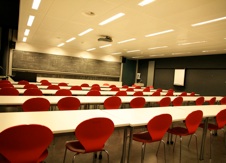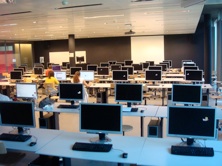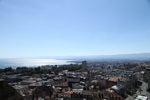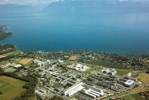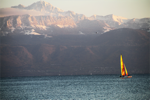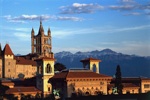SGP 2011 features a two-day tutorial on geometry processing, specifically targeted towards graduate students at the beginning of their PhD studies. The tutorial will focus on fundamental concepts and important aspects of digital geometry processing, in particular on mesh reconstruction, mesh analysis, and different methods for mesh optimization.
The tutorial consists of three lectures in the mornings, complemented by hands-on practical exercises to obtain an in-depth knowledge of the discussed topics. The tutorial will be taught by leading experts in the field, who are teaching geometry processing on a regular basis and have previously given tutorials on this topic at ACM SIGGRAPH and Eurographics.
The morning lectures will take place in BC-01 and the afternoon exercise sessions will take place in BC-07/08. The tentative schedule is:
Monday 9:00-12:00
Lecture 1: Introduction to Polygon Meshes
Lecture 2: Surface Reconstruction
Lecture 3: Discrete Differential Geometry
Monday 14:00-17:00
Exercise: 3D-Scanning, Surface Reconstruction, Curvature Visualization
Tuesday 9:00-12:00
Lecture 1: Mesh Smoothing
Lecture 2: Mesh Decimation
Lecture 3: Remeshing
Tuesday 14:00-17:00
Exercise: Mesh smoothing, decimation, remeshing
Speakers:
Pierre Alliez is Senior Researcher at INRIA Sophia-Antipolis - Mediterranee. He has authored many scientific publications and several book chapters on topics commonly referred to as geometry processing: mesh compression, surface reconstruction, mesh generation, surface remeshing and mesh parameterization. He is also an associate editor and developer of the Computational Geometry Algorithms Library and an associate editor of the ACM Transactions on Graphics.
Pierre was awarded in 2005 the EUROGRAPHICS young researcher award for his contributions to computer graphics and geometry processing. He was co-chair of the Symposium on Geometry Processing in 2008 and of Pacific Graphics in 2010. Most recently, he was awarded a Starting Grant from the European Research Council on Robust Digital Geometry Processing.
Mark Pauly is an associate professor at the School of Computer and Communication Sciences at EPFL. Prior to joining EPFL, he was assistant professor at the CS department of ETH Zurich since April 2005. From August 2003 to March 2005 he was a postdoctoral scholar at Stanford University, where he also held a position as visiting assistant professor during the summer of 2005. He received his Ph.D. degree (with distinction) in 2003 from ETH Zurich and his M.S. degree (with highest honors) in 1999 from TU Kaiserslautern. His research interests include computer graphics and animation, geometry processing, shape modeling and analysis, and computational geometry. He received the ETH medal for outstanding dissertation, was awarded the Eurographics Young Researcher Award in 2006 and an ERC Starting Investigator Grant in 2010.
Mario Botsch is a full professor for Computer Science at Bielefeld University. He received his M.S. degree in Mathematics from the University of Erlangen-Nürnberg in 1999, and his Ph.D. in Computer Science from RWTH Aachen in 2005. From 2005 to 2008 he was a senior researcher and lecturer at the Computer Graphics Laboratory at ETH Zurich. In 2008 he moved to Bielefeld University, where he is heading the Computer Graphics & Geometry Processing Group. He was awarded the Eurographics Young Researcher award 2007 for his contributions to the field of geometric modeling and digital geometry processing.
Michael Kazhdan is an assistant professor in the Computer Science Department at Johns Hopkins University. He received his PhD from Princeton University where he worked on problems in the domain of shape matching and shape analysis, using signal processing techniques to address problems of transformation invariant representations, model alignment, and symmetry detection. His more recent research has focused on the challenge of surface reconstruction and considers the manner in which Stokes's Theorem and Laplace's Equation can be used to efficiently and effectively reconstruct high-resolution models from oriented points. Currently, he is working on problems in the domain of image-processing, developing efficient streaming out-of-core algorithms for solving the large sparse linear systems associated with modeling images in the gradient-domain, and on problems in geometry processing, developing hierarchical techniques for efficiently solving the linear systems arising in surface deformation and surface evolution.





